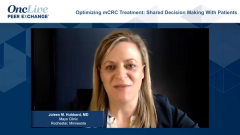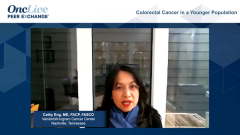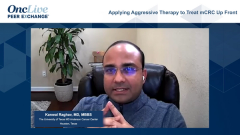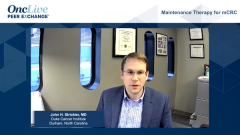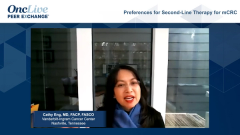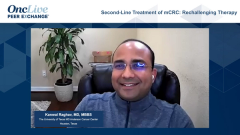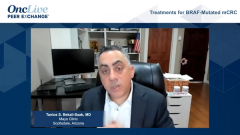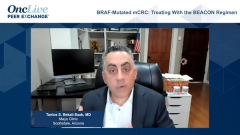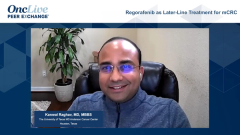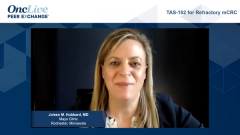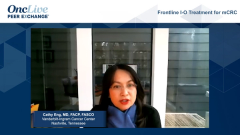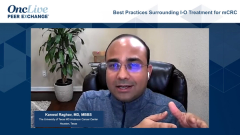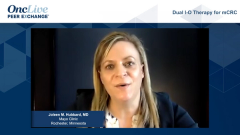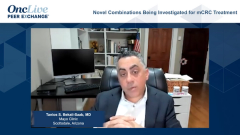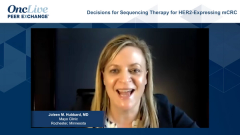
Novel Therapies for HER2-Expressing mCRC
Implications for treating patients with HER2-expressing metastatic colorectal cancer with novel agents such as trastuzumab deruxtecan and tucatinib.
Episodes in this series

Tanios S. Bekaii-Saab, MD: I want to move on to another exciting target. We touched this in our first discussion, HER2, HER2 expression, or over-expression, and we've had some data with this antibody-drug conjugate, which is trastuzumab deruxtecan in HER2-expressing metastatic colorectal cancer. John, take us through this. What are these antibody-drug conjugates? What is specific about this one showing consistently on these interesting responses across multiple malignancies?
John H. Strickler, MD: Antibody-drug conjugates are essentially antibodies, in this case, trastuzumab, linked up to a cytotoxic and, in this particular case deruxtecan, which is a topoisomerase I inhibitor. What was shown in ASCO last year by Dr. Siena and his colleagues is that using trastuzumab deruxtecan, an antibody-drug conjugate, they noted a confirmed response rate of 45% in 53 patients who were HER2 positive, metastatic colorectal cancer.
What was also interesting about that data is that they were seeing a similar response rate in patients who had failed prior trastuzumab-based therapy. It suggested that this particular therapy, trastuzumab deruxtecan, would be active either before failing trastuzumab or even after failing a trastuzumab combination. Overall, interesting data that's being followed up on in larger trials.
Tanios S. Bekaii-Saab, MD: These antibody-drug conjugates only care about whether the receptor is present or not. It doesn't care about whether it's active or not or whether it's targetable or not. It just needs it to dock and releases the cytotoxic agent into that. We know there's more work that is being done between you and Raghav. Raghav, you're leading a trial through Schwab. Tell us more about it and what the rationale is for it.
Kanwal Raghav, MD, MBBS: The Schwab trial is a randomized trial of trastuzumab pertuzumab, a combination similar to trastuzumab tucatinib and trastuzumab lapatinib, which all target dual anti-HER2 inhibition. But like John pointed out, all of these are strategies that shut down an active HER2 pathway. They will all tend to work in a RAS wild-type population, RAS, and BRAF wild-type population where HER2 is active. The rationale for cetuximab, especially for Scwab1613, is to look at that effect sides. We understand that EGFR [epidermal growth factor] is not only a positive predictor biomarker for anti-HER2 efficacy, it also appears to be a negative predictor biomarker for anti-EGFR therapy. The aim of that trial is to select the right patients where you can give anti-EGFR followed by trastuzumab.
Tanios S. Bekaii-Saab, MD: You're referring to HER2 amplifications?
Kanwal Raghav, MD, MBBS: All of these patients are HER2 amplified. One of the things, which John and I have discussed and published on is, our classic way of thinking about mutations is very binary. We think of a mutation as being present or not present. But HER2 as a gene amplification is a continuous variable, and there is a cutoff beyond which anti-EGFR doesn't work, and anti-HER2 would work well. A cutoff below which the conventional HER2 strategy may not work and anti-EGFR is still beneficial. That's the purpose of that trial. Of course, it ends up on the data that we already have, which shows us that HER2 is beneficial, dual anti-HER2 inhibition is very beneficial in these patients.
Tanios S. Bekaii-Saab, MD: John, you've done some pivotal work with this agent, called tucatinib, that's approved now in breast cancer. Tell us more about what do you think is the differential between tucatinib and other similar agents? What's different about Mountaineer, and where is this going next?
John H. Strickler, MD: We've been doing extensive profiling on our patients for years. We've seen interesting data, initially out of Italy from the HERACLES trial, looking at the combination of lapatinib and trastuzumab. That showed response rates around 30%, with progression-free survival in the 4-month range. The challenge of some of those therapies is that there can be toxicity from some of these therapies, specifically diarrhea, and rash. Tucatinib has emerged in recent years, and its distinguishing factor is it's highly selective against HER2 and has very limited activity against other targets outside of HER2. The advantage here is that you get a complete target inhibition, in this case, HER2 inhibition, without inhibiting other receptors, like EGFR. We see a complete blockade of HER2 with limited rash, diarrhea, and other symptoms that we see with other therapies.
We presented that data at ESMO in 2019 and showed that we were able to generate response rates approaching 50%, the tolerability was outstanding for the trastuzumab, tucatinib combination. What was most impressive is that, because it was so well-tolerated, patients were able to sustain that opening dose with very few dose reductions. We were seeing incredibly long durations of disease control out of that particular combination. Based on those initial results, where we have launched a larger, international trial, looking at this combination.
Transcript Edited for Clarity


